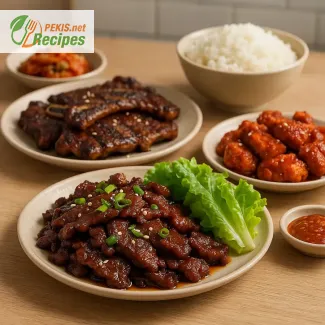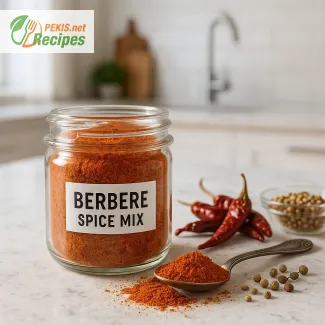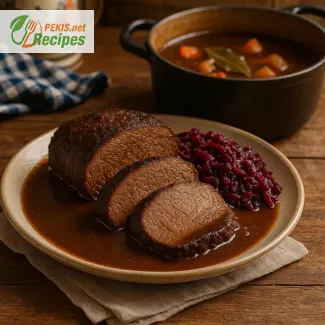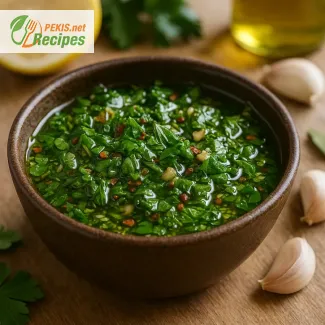
Unlock the Flavors of Authentic Korean Grilling at Home
Discover the taste of bulgogi, galbi, and gochujang marinades in a sizzling Korean BBQ feast
There is something undeniably irresistible about a Korean BBQ experience — the enticing aroma of sizzling meat, the crackle of the grill, the vibrant array of side dishes, and the bold, complex flavors that awaken every sense. Whether enjoyed in a bustling Seoul eatery or recreated at home, Korean BBQ recipes like bulgogi, galbi, and gochujang marinades offer a rich culinary tradition that bridges the gap between comfort food and celebration.
Rooted in centuries of cultural refinement and regional adaptation, Korean BBQ is more than just grilled meat — it’s a curated interplay of sweetness, heat, umami, and smoke. At the center of this flavorful world are bulgogi, a thinly sliced beef marinated in a sweet-savory soy base; galbi, the succulent short ribs soaked in garlic-pear infused goodness; and gochujang marinades, built on the deep red heat of Korean fermented chili paste.
Why Korean BBQ is the ultimate grill experience
What sets Korean BBQ apart from other grilling traditions is its interactive and communal nature. It’s a meal designed for shared moments — where each person grills, wraps, dips, and builds their perfect bite. But just as important as the atmosphere are the marinades themselves. A great bulgogi marinade balances soy sauce, sesame oil, sugar, garlic, and grated pear, infusing the beef with both depth and tenderness. In contrast, galbi marinade relies on fruit purées, toasted sesame, and ginger to break down the short ribs and build rich caramelized flavors on the grill.
Then there’s the fiery heartbeat of Korean cuisine: gochujang. This fermented red chili paste is the essential ingredient for countless marinades, providing spice, body, and a distinct umami kick. When combined with soy sauce, vinegar, garlic, and honey, gochujang marinades create the ideal glaze for grilled chicken, pork, or even tofu — smoky, sticky, and addictive.
The art of balancing flavors in Korean BBQ marinades
Every great Korean BBQ recipe is a masterclass in contrast and harmony. Bulgogi offers a sweet, almost buttery melt-in-your-mouth sensation due to the thin slices of beef and sugar-pear base. Galbi is chewier, more robust, with a slightly smoky, caramelized exterior. And gochujang-based marinades elevate any meat or vegetable with their heat and pungency.
The magic lies in the ingredients. Asian pear adds a gentle fruitiness and natural tenderizing enzymes to the bulgogi marinade. Soy sauce and sesame oil form the backbone of both bulgogi and galbi, while garlic, ginger, and scallions round out the aromatic profile. Brown sugar or honey gives the meat a glossy finish when grilled. Meanwhile, gochujang adds depth and complexity, transforming simple ingredients into layered flavor bombs.
A feast beyond the grill
While the grilled meat takes center stage, Korean BBQ is incomplete without its vibrant cast of accompaniments. Think of crisp lettuce leaves for wrapping, bowls of steamed rice, pickled radish, and classic banchan like kimchi, spicy cucumber salad, or soy-braised potatoes. Dipping sauces such as ssamjang — a mix of gochujang, doenjang, garlic, and sesame oil — amplify every bite.
Even the cooking method adds to the sensory experience. Using a cast iron grill pan or a tabletop grill, the sizzling sound and smoky scent build anticipation and deepen the umami flavors. Whether you're marinating overnight or preparing a quick midweek meal, Korean BBQ recipes offer versatility for both casual dinners and special occasions.
Bringing Korean BBQ home: what you need
Recreating Korean BBQ at home doesn’t require a commercial grill or a trip to Seoul. With a few key pantry items — gochujang, soy sauce, sesame oil, rice vinegar, garlic, and Asian pear or apple — you can prepare authentic marinades that rival your favorite Korean restaurant. High-quality cuts of beef like ribeye or sirloin work beautifully for bulgogi, while beef short ribs are traditional for galbi. Pork belly, chicken thighs, or tofu also shine when glazed in a spicy gochujang marinade.
The secret is to let the marinade do the work. A proper soak of 4–24 hours ensures the flavors penetrate deeply, tenderize the meat, and create that signature Korean BBQ glaze once seared. For those short on time, even a quick 30-minute marination can deliver mouthwatering results — especially with thinner cuts like bulgogi beef.
A sensory journey worth repeating
Each bite of Korean BBQ tells a story — of culinary tradition, of shared tables, and of bold flavor combinations that delight. Whether you prefer the delicate sweetness of bulgogi, the deep char of galbi, or the spicy kick of gochujang marinades, these recipes bring the soul of Korean cooking into your kitchen. Every element, from the marinade to the grilling method to the way it's served, is part of a rich sensory ritual that elevates home dining to something extraordinary.
1. Prepare the marinades
In three separate bowls, mix the ingredients for each marinade. Combine well to form a uniform consistency.
2. Marinate the meat
Place the sliced ribeye into the bulgogi marinade, ensuring all pieces are fully coated.
Place the beef short ribs in the galbi marinade, massaging the sauce into the meat.
Add the pork or chicken pieces into the gochujang marinade and stir to coat thoroughly.
Cover each bowl and refrigerate for at least 4 hours or ideally overnight.
3. Prepare your grill or pan
Heat a cast iron skillet or grill over medium-high heat. Lightly oil the surface.
4. Grill the meats
Grill the bulgogi slices in a single layer for 1–2 minutes per side until browned.
Grill the galbi ribs for 3–4 minutes per side until caramelized and cooked through.
Grill the gochujang marinated meat for 2–3 minutes per side until slightly charred and sticky.
5. Assemble the meal
Serve each meat on a platter with lettuce leaves, steamed rice, kimchi, and ssamjang. Diners can wrap meat in lettuce with a dollop of sauce and rice for a full Korean BBQ experience.
Creative twists to elevate your Korean BBQ recipes at home
Flavor-enhancing tips for bulgogi, galbi, and gochujang marinades
Korean BBQ is renowned for its dynamic fusion of flavors, from the sweet-savory profile of bulgogi to the deep umami of galbi, and the fiery complexity of gochujang marinades. While the traditional recipes are already rich and satisfying, there’s always room to refine, elevate, or adapt them for dietary preferences, enhanced taste, or unique presentation. Knowing how to balance, substitute, and improve ingredients without losing the essence of these dishes is what turns a good meal into an unforgettable one.
How to enhance the depth of bulgogi flavor
One of the most beloved Korean BBQ dishes, bulgogi, offers a tender, sweet, and slightly smoky experience. The traditional marinade includes soy sauce, garlic, sugar, Asian pear, and sesame oil — a winning combination. But to deepen the umami notes, consider adding:
- A touch of fish sauce (1 tsp): Adds depth and a subtle brininess that enhances the beef’s natural flavors.
- Dried shiitake mushroom powder (½ tsp): A concentrated source of umami that brings an earthy roundness.
- A splash of dark soy sauce: Richer and more robust than regular soy, ideal for beefy marinades.
These additions amplify the complexity of the marinade, especially when paired with high-fat cuts like ribeye. For a more tender and flavorful bulgogi, freeze the beef slightly before slicing and marinate for a full 24 hours.
Galbi marinades with a twist
Traditional galbi (Korean grilled short ribs) rely on a marinade made from soy sauce, brown sugar, garlic, pear, and onion, delivering a sweet, rich flavor. However, the texture and caramelization can be improved with thoughtful modifications:
- Use fresh pineapple juice instead of Asian pear: This not only tenderizes the meat more effectively due to bromelain, but also adds a tropical acidity.
- Add a tablespoon of grated apple for a soft tartness that complements beef fat.
- Replace some brown sugar with honey: It caramelizes better and creates a deeper glaze on the meat when grilled.
If you're aiming for a more charred, BBQ-style result, reduce the water content in the marinade and pat the meat dry before grilling.
Customizing gochujang marinades for broader palates
Gochujang, with its spicy, fermented punch, can be overpowering for some. You can adjust the heat level and balance without losing the dish’s personality by:
- Adding a spoonful of Greek yogurt or sour cream to mellow the heat for beginners.
- Mixing in miso paste to increase umami and bring down the chili's bite.
- Blending in citrus juice (lime or yuzu) to brighten the flavor profile and balance the paste’s sweetness.
To create a healthier alternative, substitute honey with monk fruit syrup or date syrup, and use low-sodium soy sauce to reduce salt content without compromising on depth.
Common mistakes and how to avoid them
Many home cooks make avoidable errors when preparing Korean BBQ. The most frequent include:
- Over-marinating delicate cuts: While short ribs can handle 24 hours in the fridge, thinner cuts like bulgogi should be marinated for 4–8 hours to prevent a mushy texture.
- Neglecting to pat meat dry before grilling: Excess marinade can cause steaming instead of searing, resulting in a lackluster finish.
- Using low-heat grills: A lack of intense heat prevents the necessary caramelization and Maillard reaction.
Avoid these pitfalls by respecting meat texture, maintaining high cooking temperatures, and resting grilled meat briefly before serving.
Why homemade always wins
While Korean BBQ restaurants are celebrated for their authentic flavors, preparing it at home has distinct advantages:
- Control over ingredients: You can select high-quality meat, adjust salt and sugar content, and avoid additives or MSG.
- Tailored flavors: Marinades can be adjusted to personal heat tolerance, sweetness, or umami preferences.
- Health-conscious choices: You can switch to lean meats, reduce oil, or eliminate common allergens like gluten or sesame.
Homemade BBQ also lets you experiment with fusion techniques — try adding a hint of smoked paprika for a Western BBQ undertone or pairing galbi with balsamic-glazed vegetables for a surprising side.
Smart substitutions for dietary needs
If you or your guests have dietary restrictions, many components of Korean BBQ can be easily substituted:
- Gluten-free: Use tamari or coconut aminos instead of soy sauce, and ensure your gochujang is gluten-free or homemade.
- Low-carb/keto: Replace brown sugar with erythritol or monk fruit sweetener, and skip rice in favor of grilled vegetables or lettuce wraps.
- Vegan alternatives: Swap meats for portobello mushrooms, tempeh, or tofu, which absorb marinades well and grill beautifully.
These changes make Korean BBQ inclusive without sacrificing its bold, signature flavors.
Experimenting with presentation and side pairings
Traditional sides like kimchi, pickled radish, and ssamjang are classics, but the visual and flavor presentation can be enhanced:
- Serve on dark ceramic plates to contrast the caramelized meat colors.
- Garnish with toasted sesame seeds, microgreens, or edible flowers for visual appeal.
- Pair with infused waters or rice wine spritzers to complement the spice and richness.
Adding subtle layers in plating, sauces, and textures turns a traditional dish into a refined centerpiece.
Incorporating modern techniques for better results
Modern culinary tools can help improve the consistency and flavor of Korean BBQ:
- Sous vide the galbi before grilling for maximum tenderness.
- Use a kitchen torch for extra char on gochujang-glazed meats.
- Smoke box in a grill adds traditional wood-fired aromas.
These techniques elevate Korean BBQ beyond street food, allowing for restaurant-quality execution at home.
By understanding the chemistry behind marinades, the balance of flavors, and the culinary creativity possible with traditional ingredients, Korean BBQ becomes a canvas for continuous improvement.
Allergens present:
- Soy (soy sauce)
- Sesame (sesame oil, ssamjang)
- Gluten (soy sauce, gochujang, ssamjang)
- Garlic and onion (for those with allium sensitivity)
Suggestions for allergen/gluten replacement:
- Use tamari or gluten-free soy sauce instead of regular soy sauce.
- Replace gochujang with a homemade gluten-free chili paste using chili flakes, rice syrup, and miso.
- Substitute sesame oil with olive oil if allergic to sesame.
- Omit garlic/onions or use garlic-infused oil for low-FODMAP diets.
Vitamin B12: 2.3 µg (96%) – contributes to red blood cell formation and neurological function
Iron: 3.8 mg (27%) – supports oxygen transport in blood
Zinc: 6.2 mg (56%) – vital for immune function and wound healing
Vitamin C: 10 mg (11%) – supports immune defense and antioxidant protection
Vitamin A: 420 IU (14%) – important for vision and cell growth
Magnesium: 55 mg (14%) – supports muscle and nerve function
Potassium: 610 mg (13%) – helps maintain normal blood pressure
- Gochujang (capsaicin): ~40 mg – reduces inflammation and supports metabolic function
- Garlic (allicin): ~5 mg – antimicrobial and supports heart health
- Gingerol from ginger: ~6 mg – anti-inflammatory and aids digestion
- Sesame lignans (sesamol): ~12 mg – promote cardiovascular protection and oxidative stress reduction





